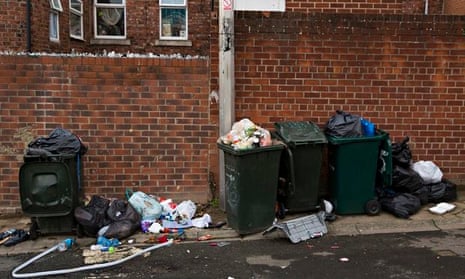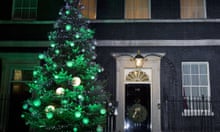Local authorities will be pushed to breaking point by the latest round of multibillion-pound cuts to their funding, council leaders have warned.
The communities and local government minister, Kris Hopkins, announced what he called a fair financial settlement for councils in 2015-16. English councils will face an average cut of 1.8% in spending power and Hopkins said no council would see more than a 6.4% cut.
“Therefore every council should be able to deliver sensible savings while protecting frontline services for local taxpayers,” he said.
But the group that represents local government heads, who currently oversee spending of £114bn a year in England, said the reduction in central government grants amounted to an average 8.8% cut next year, around £2.6bn in cash terms.
The government’s spending power figures represent the totality of funds available to councils, including business rates and NHS cash notionally available to local government social care services.
The 8.8% figure refers to the amount of grant given directly to councils by the government.
The chairman of the Local Government Association (LGA), David Sparks, said: “We cannot pretend that this will not have an impact on local government’s ability to improve people’s quality of life and support local businesses.
“It is individuals who have paid the price of funding reductions, whether it is through seeing their local library close, roads deteriorate or support for young people and families scaled back.”
The shadow communities and local government secretary, Hilary Benn, accused the government of favouring Tory-voting areas, saying socially deprived cities in the north had received bigger cuts than areas in the south-east such as Wokingham.
However, Tory council leaders were also highly critical of the latest round of cuts. David Hodge, Conservative leader of Surrey county council, told BBC Radio 4: “There is a limit. You can only cut local government so far.”
The LGA estimates that central funding for councils has shrunk by 40% overall since 2010, and this decrease has come at a time when demand for core services such as child protection and social care of older people is rapidly increasing.
Graeme McDonald, director of the Society of Local Authority Chief Executives and Senior Managers, said: “This settlement reminds us that the financial challenge facing local government is immense. Cuts of up to 6.4% will push some authorities to breaking point.”
Professor Tony Travers of the London School of Economics said the settlement prefaced at least five more years of cuts to come for councils as they bore the brunt, with other departments, of the coalition’s plans to make huge public spending cuts while protecting health, education and overseas aid budgets.
He praised local government’s resilience in the face of huge budget reductions, saying “if they did this to the NHS, the skies would fall in”.
The communities and local government secretary, Eric Pickles, appeared to have lost a battle with coalition colleagues over his proposals to force councils and police authorities to hold a referendum if they opt to raise council tax by more than 1%. Ministers confirmed that the threshold will remain at 2%.
It is understood the home secretary, Theresa May, and Lib Dem ministers opposed lowering the threshold. A number of councils, including Tory-run authorities, are proposing to put up council tax by 1.95% next year. Reducing the threshold would have forced them to find tens of millions of pounds more in cuts.
Hopkins said: “We have been working to give hard-working people greater financial security by taking action to keep council tax down. There is extra money on the table for all councils which pledge to freeze council tax bills next year, and we would urge them to take it to help their residents with the cost of living.”
Despite speculation that ministers would partially reverse plans to end £180m central funding for local welfare assistance schemes aimed at providing crisis help for the most vulnerable, Hopkins said that no additional money would be provided.
Local welfare provision offers emergency help for a range of vulnerable people who fall into unexpected crisis, including women fleeing domestic violence, homeless people, pregnant mothers, care leavers, pensioners and people suffering from chronic physical and mental health problems.
Councillor Andy Hull, executive member for finance at Islington council, which alongside poverty charities has led a campaign against cuts to local welfare called the decision “an early Christmas present from the government for loan sharks and payday lenders.”
Despite significant cuts in local authority funding over recent years, Hopkins said the majority of residents “remain satisfied with the way their council runs things”, adding that this “bears testament to the great skill that authorities have shown in prioritising and promoting efficiencies”.




Comments (…)
Sign in or create your Guardian account to join the discussion